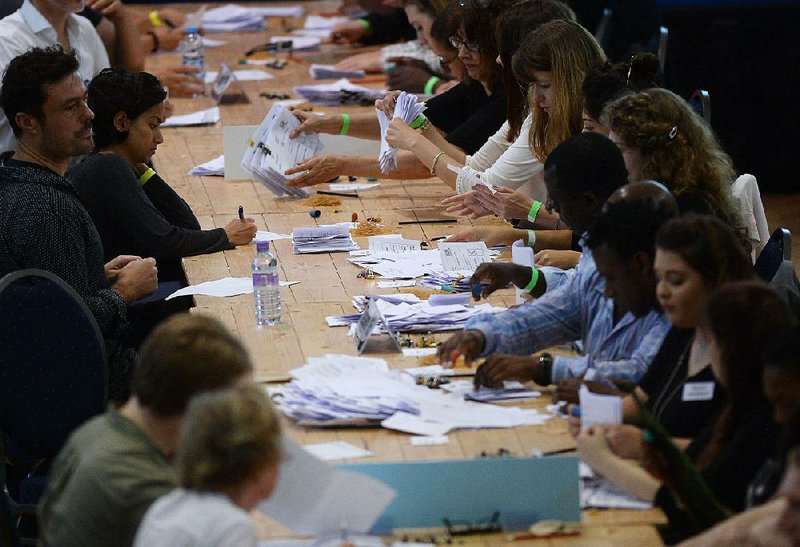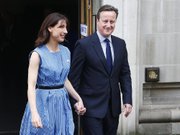LONDON -- Britain voted Thursday to leave the 28-nation European Union, an unprecedented divorce that stands to take decades to complete and sent global markets plunging today.
LATEST UPDATES
NEW: Cameron says he will resign by October. Click here for Friday updates on Britain's vote to leave the European Union.
The decision heads the United Kingdom toward a yearslong process to renegotiate trade, business and political links between that country and what will become a 27-nation bloc.
By early morning today, the "Leave" campaign had declared victory. The pound plummeted to a 31-year low.
The pound suffered one of its biggest one-day falls in history, dropping more than 10 percent in six hours, from about $1.50 to below $1.35, over concerns that severing ties with the single market will hurt the U.K. economy and undermine London's position as a global financial center.
"The dawn is breaking on an independent United Kingdom," U.K. Independence Party leader Nigel Farage declared to cheers at a "Leave" campaign party.
"Let June 23 go down in our history as our independence day!"
As results poured in, a picture emerged of a sharply divided nation: Strong pro-EU votes in the economic and cultural powerhouse of London and semiautonomous Scotland were countered by sweeping anti-establishment sentiment for an exit across the rest of England, from southern seaside towns to rust-belt former industrial powerhouses in the north.
"A lot of people's grievances are coming out, and we have got to start listening to them," deputy Labor Party leader John McDonnell said.
The financial markets, and officials from Washington to Brussels to Frankfurt, Germany, monitored the outcome cautiously as the votes were counted. The pound surged against the dollar over the past week as traders anticipated that voters would choose to remain in the bloc, and British bookmakers did a brisk business taking bets.
Voting started at 7 a.m. and ended at 10 p.m., although some particularly crowded poll sites stayed open longer to accommodate voters who had gotten in line to cast their ballots. Counting began in 382 locations, with the results collated in 12 regional centers.
The overseas territory of Gibraltar was the first to report results late Thursday, and as expected the British enclave reported an overwhelming vote for "Remain" -- 96 percent.
Officials in Gibraltar said almost 84 percent of eligible voters turned out to cast ballots; witnesses and reporters elsewhere said turnout was higher than in last year's general election, which was 66 percent.
Other early results, from England's working-class northeast, were a slight "Remain" win in Newcastle and wide win for "Leave" in nearby Sunderland.
Torrential rains, especially in the "Remain" stronghold of London, raised fears of a diminished turnout. London's Fire Brigade took 550 weather-related calls as the capital was hit by heavy precipitation, thunderstorms and lightning strikes. Some polling stations were forced to close because of flooding.
By the Thursday evening rush, rains had caused delays on several subway lines and brought foot traffic at Waterloo, the capital's busiest train station, to a standstill. Many Britons posted photos of themselves accompanied by their dogs and cats, prompting Internet memes.
Cameron's Future
With the stumping over, politicians were left with little to do but vote. Three leaders of the "Remain" campaign -- Prime Minister David Cameron of the Conservative Party; the leader of the opposition Labor Party, Jeremy Corbyn; and Mayor Sadiq Khan of London -- all voted in the capital.
So did Boris Johnson, the former London mayor who was the most prominent face of the "Leave" campaign, and Michael Gove, the justice secretary. Farage cast his ballot in Kent, in southeast England.
Cameron, who in February set the date for the referendum, faces an uncertain future whichever side wins. Almost half the lawmakers from his Conservative Party backed an exit from the EU.
"If the prime minister loses this I don't see how he can survive as prime minister," said Scottish National Party lawmaker Alex Salmond. "Talk about lame ducks. This would be a duck with no legs and no stability whatsoever."
At a referendum-night party at the London School of Economics, Kevin Featherstone, the head of the European Institute, said that whichever way things went, the vote should serve as a wake-up call to politicians across the continent.
"One of the deeper headlines from tomorrow, of a narrow victory either way, is that wider Europe has got to learn the lesson about how to re-engage with ordinary publics," he said. "We can see across Europe countries which have been ... far bigger supporters of the European Union for a number of years starting to have serious doubts."
In the city, banks including Barclays and JPMorgan Chase had employees bring sleeping bags or book hotel rooms as they settled in for a long night, with the prospect of tremendous market volatility this morning if the U.K. voted to leave.
U.K. Voters React
Before the polls closed, news organizations were prohibited from reporting accounts of how people voted, but in interviews, Britons expressed their concerns in more general terms.
"I think it is going to be really close," said photographer Antony Crolla, 49, outside a London polling station.
Hilary Clarke, a 45-year-old stay-at-home mother, was the first to vote at a southwest London polling station. She said she would use her stubby pencil to check "Remain" on her ballot.
"If I had been confident, I wouldn't be standing in the rain at 7 in the morning," she said. "The reason I'm first in the queue is I'm going straight to the airport to go to Barcelona, and I may not return if vote goes the wrong way."
Clarke said she could not understand the logic of those pushing to leave.
"I can see that sometimes it seems we are hemorrhaging money to the EU," she said. "But at the same time, we seem to get so much more back than we give. Even if you're disagreeing with what's said at the table, it's better to have a place at it."
But Andreas Hajialexandrou, a 48-year-old businessman of Greek Cypriot heritage, disagreed, saying the country could simply not withstand the impact of record numbers of immigrants from elsewhere in Europe.
"There are pressures on local services. I speak to our local [doctors] and they are just swamped," he said. "The question is, how long can you support that level of immigration?"
In Oldham, near Manchester, a traditional stronghold of the Labor Party, Lisa Kirk, 43, said she and her family had been swayed by the U.K. Independence Party, which opposed the U.K.'s membership in the EU, and expressed disenchantment with British leaders.
"They're just letting all the foreigners in, and there is nothing left in the system for us," she said.
In the 18th-century spa city of Royal Tunbridge Wells, in the southeast, Michael Selway, 54, expressed worry about the future of European integration.
"This project was set up by people who had fantastic intentions -- no more war -- and now it might all come to a crashing end," he said.
Older voters were seen as being particularly disenchanted with the EU, and younger voters more attracted to the possibility of studying and working on the Continent. But there were many exceptions.
Helen Lickerman, 67, said there was a general tendency to move away from European integration. "Never mind the ins and outs of the economy," she said at an interview at St. Giles Cripplegate Church in the Barbican, a residential and arts complex in the capital's financial district. "There's a general feeling of being part of a community, and the history, the past wars, is something we don't want anymore."
In the small town of Birstall in West Yorkshire, voters streamed into a library outside of which, exactly a week ago, pro-EU lawmaker Jo Cox was killed on her way to meet with constituents. A crowd of hundreds held hands during a minute of silence at 12:50 p.m. -- the time of the attack -- and chanted, "We stand together."
Before Cox's killing, "Leave" had been surging in the polls. After the 41-year-old's death -- and the subsequent charging of a man who gave his name in court as "death to traitors, freedom for Britain" -- the pendulum began to swing back.
The two official campaigns fired away on Twitter in messages that reflected the sharply negative turn the debate had taken in a country where civility and decorum have been distinctive characteristics of the political culture.
There was a last-minute controversy as "Remain" seized on an email that "Leave" sent to supporters, which said, "There is a very real chance that voters in London and Scotland will vote to keep us in the EU today despite the heartlands of the country voting to leave." The "Remain" campaign urged its supporters: "Don't let them divide our country. Vote Remain."
"Leave" told its followers on Twitter: "Today's referendum is about democracy. If you cherish it and it matters to you at all, then please #VoteLeave and #TakeBackControl." The campaign relentlessly criticized the EU as an unaccountable and faceless bureaucracy that was subsidized by the U.K. and offered little in return, while forcing migrants onto Britain through its insistence on the free movement of labor, capital, goods and services.
It was only the third nationwide referendum in British history. In the first, in 1975, Britons affirmed their membership in a forerunner to the European Union, the European Economic Community, which they joined in 1973. In the second, in 2011, voters rejected a change to the system by which members of Parliament are elected.
Information for this article was contributed by Sewell Chan, Kimiko de Freytas-Tamura, Alison Smale, Pauline Bock, Stephen Castle and Iliana Magra of The New York Times; by Raphael Satter and Jill Lawless of The Associated Press; and by Griff Witte, Karla Adam and Dan Balz of The Washington Post.
A Section on 06/24/2016

